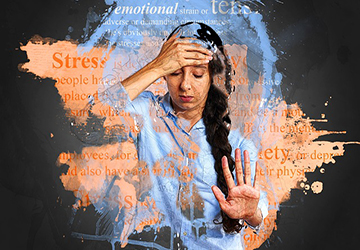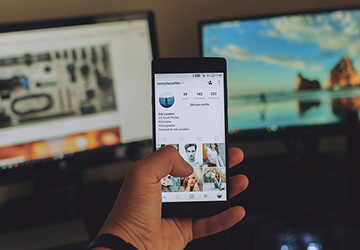Do you mindlessly scroll through your feeds, comparing yourself with others? Or do you opt for a more mindful approach and look for positivity and motivation?
Regardless of where you fall on the spectrum, it is evident that Social Media plays an imperative role in how we think and function. Therefore, it can have a substantial impact on our emotional health.

In this article, we will explore ways social media influences your mental well-being and provide tips on how to use social media mindfully. So let's dive right in!
Social Media and Mental Health – the Impact
Social media's excessive use has been linked with severe psychological disorders such as anxiety, depression, eating disorders, feelings of loneliness, low self-esteem, and body dysmorphia. Most studies establishing this link revolve around teenagers and young adults, as they tend to be the most prominent social media consumers and, as a result, are affected the most.
Anxiety
Anxiety is perhaps one of the most closely related mental health issues associated with social media usage.
The form of communication on social media is primarily non-verbal; texting, commenting, and tweeting. This type of communication lacks significant components of social interactions like facial expressions, tone of voice, and body language. Often, this can lead to miscommunication, causing people to panic over something originally menial.
Depression
More often than not, people only choose to show their good side on social media. Most people won't post about going to a funeral, but they will post about going to a concert. This creates a false perception of other people's lives which boils down to one thing: social comparison. This unhealthy characteristic of comparing yourself with the idealized version of other people can cause feelings of inadequacy and jealousy, ultimately leading to depression.
Studies have revealed that several factors associated with social media use contribute to depression, including:
· Loneliness and FOMO (fear of missing out) – Feel left out, mainly when their social circles do not involve them.
· Cyberbullying – The target of hate/racism/sexism and other forms of harassment is strongly linked with social media use, leading to depression.
· Self-criticism, Self-doubt, and Low self-esteem – People who observe the accomplishments, achievements, and physical appearance of others may become self-critical. They experience failure and sadness, ultimately losing confidence.
Eating Disorders
Research conducted in Pittsburgh, Pennsylvania, on participants between the ages of 19 and 32 revealed findings that connected social media to eating disorders. According to the results, young adults who spent a lot of time on social media were highly likely to complain of concerns about their eating habits, such as overeating and dieting.
Furthermore, it established that people exposed to more visual content like TikTok and Instagram were more likely to engage in abnormal eating habits. The study also demonstrated a link between social comparison and eating disorders.
How to Use Social Media Mindfully – Tips for a Healthier Relationship with Technology
Despite its adverse impacts on our mental health, social media can significantly improve our life and social interactions. The secret lies in balance and maintaining the perfect boundaries with it.
Let's talk about how to use social media mindfully.
Set boundaries
As discussed earlier, social media is designed to be addictive. The time spent on social platforms is proportional to the negative impacts on your mental health.
It's essential to set boundaries on the amount of time you spend on social media. This can be accomplished by setting a time limit and sticking to it or by scheduling specific times of day for social media use.

Practice Self-awareness
To counter problems such as body dysmorphia and social comparison, remember that social media is merely a highlight. Most of what you see is an inaccurate depiction of life because it only shows the highs and not the lows, the ups and not the downs.
Practicing self-awareness by acknowledging your emotions and thoughts while using social media is best. Take breaks when you feel overwhelmed, and prioritize your emotional well-being.
Customize your Feed
Our mental health is profoundly impacted by what we consume on social media. Therefore, ensuring your feed is free of harmful content is necessary.
It would help if you practiced only those accounts that somehow make you happy or inspire you. If you find a statement you believe is unsuitable for you or makes you feel anxious, inadequate, or unhappy, do not hesitate to unfollow it.
Most apps allow you to hide content that you dislike. For example, on Instagram, if you find a post disturbing, you can tap on "not interested." This hides the bar and modifies the algorithm which monitors the posts on your feed, preventing such posts from entering your meal in the future.
Engage with Others Mindfully
Engaging with others on social media can be a great way to make friendships and build connections. However, mindful social media use can make this experience more positive and fulfilling and help prevent negative consequences such as addiction, social comparison, and anxiety.
Some things you should keep in mind are:
· Avoid engaging in arguments
· Avoid negative interactions
· Build positive relationships
· Limit your time with others on social media
· Block/remove any person adversely affecting your health
· Report cyberbullying
· Practice gratitude
· Be mindful of your emotions
Take Breaks
Lastly, taking breaks from social media from time to time is essential. Even if the gap is just for a few hours or a day, taking a break can help take your mind off anything bothering you.
Using this time to do other enjoyable and valuable things would be ideal. Read a book, play a sport, cook something for yourself, or go out for a stroll; anything that takes you away from social media for a while.You can deactivate your account if you want a more extended break to focus on yourself. Many social platforms let you deactivate your account, temporarily deleting your account while you work on your mental peace and well-being.
Conclusion
In conclusion, it has been established that excessive use of social media is linked with adverse effects on our mental health, including anxiety, depression, and more. However, by applying practical methods to improve your experience on these platforms, you can turn your social media use into a positive experience that enhances your well-being. Remember to prioritize your mental health and use social media to connect, inspire, and spread positivity.




